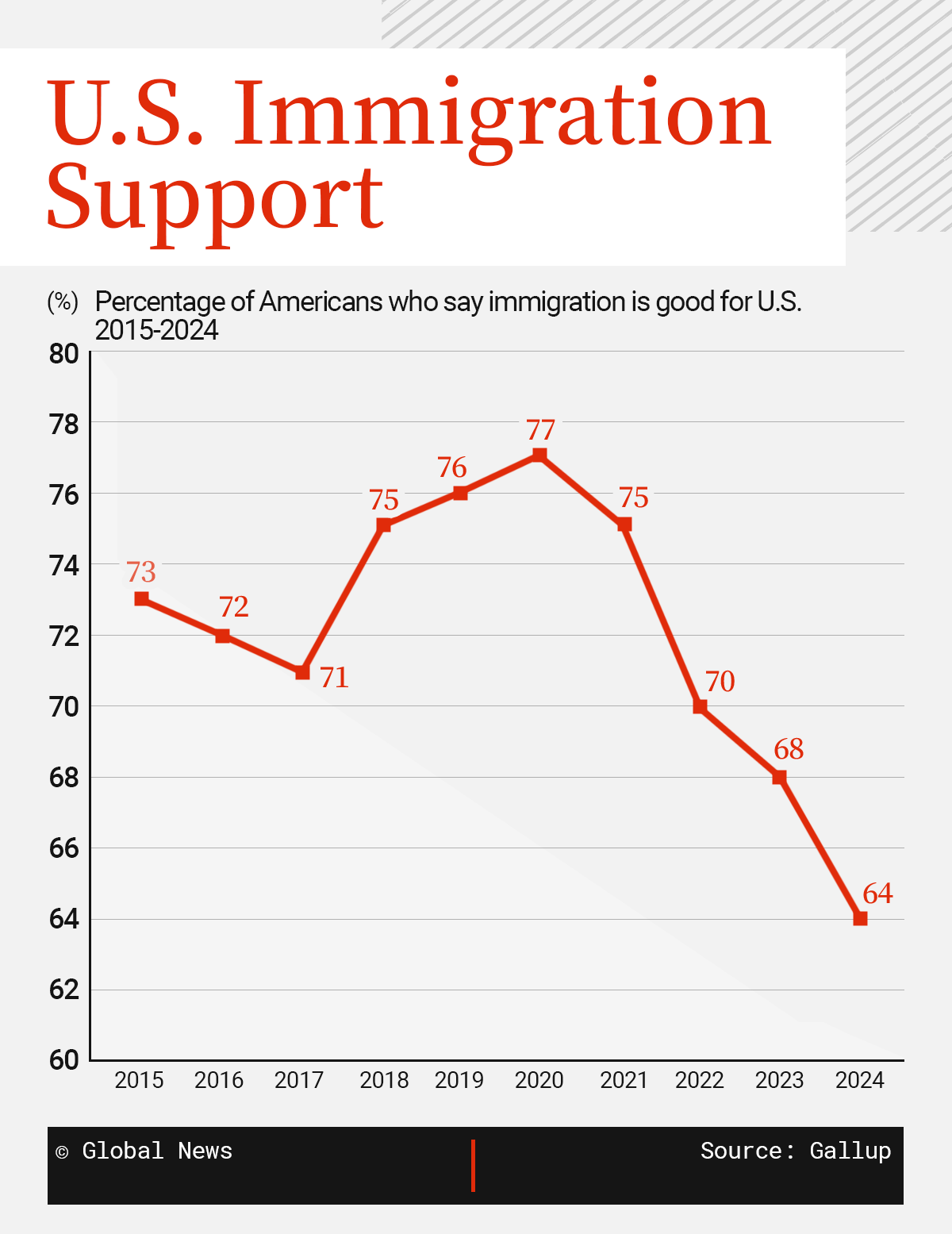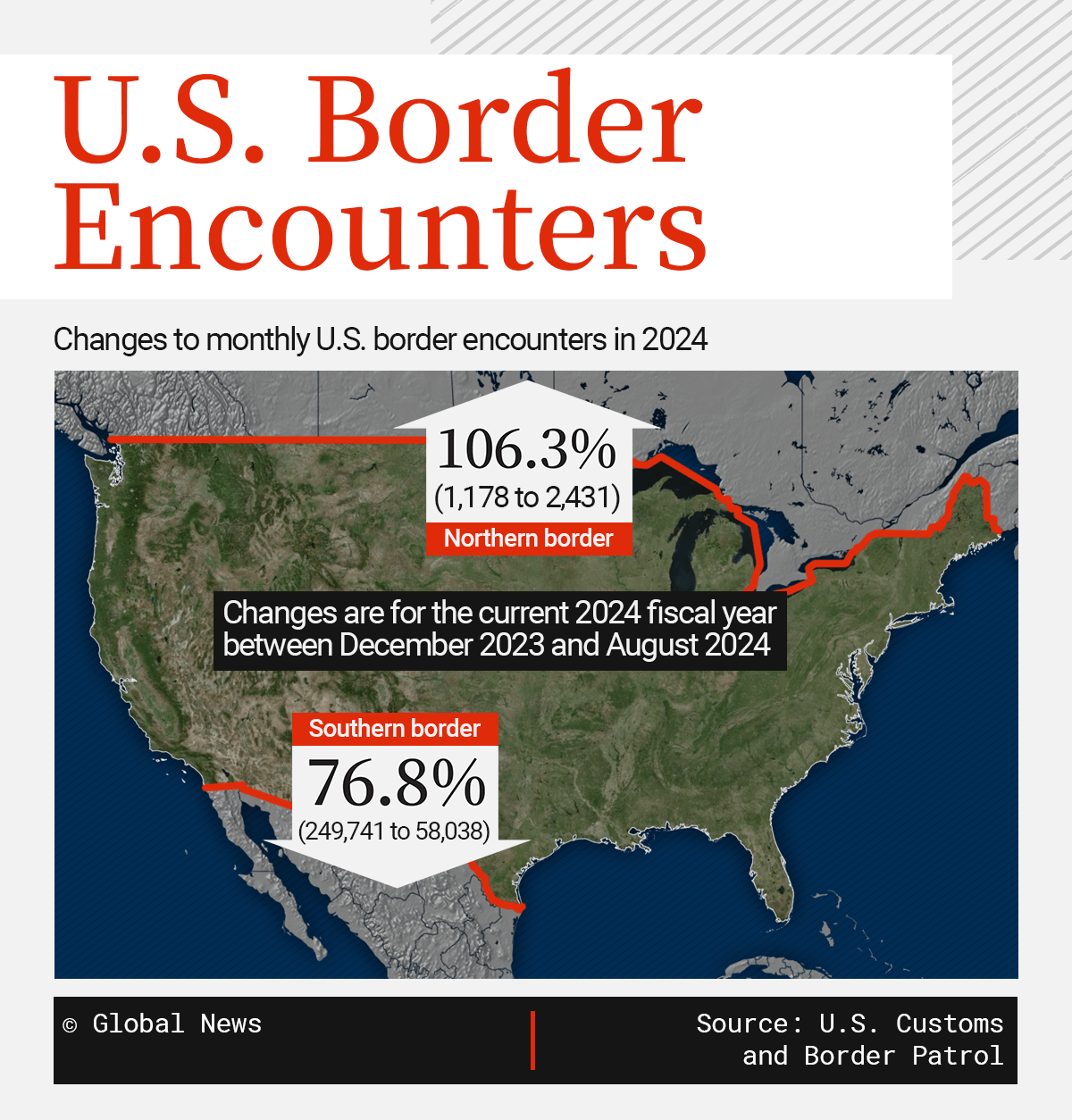The close U.S. presidential election between Vice-President Kamala Harris and Donald Trump could be decided on the issue of immigration, and either result will have implications for Canada.

While the economy has been identified as a top concern among American voters, immigration is not far behind, with more people saying they want a clampdown at the borders.
Polling by Gallup has found a majority of Americans want immigration levels decreased. The number saying so — 55 per cent — is the highest since 2002. Although 64 per cent say immigration is an overall good thing for the country, that figure is the lowest in 10 years.
Trump has based much of his campaign around tackling unauthorized or “illegal” immigration, with policy proposals including mass deportations and other severe crackdowns. Although Harris is supportive of immigration overall, she has called for more conservative policies compared to past Democratic platforms — in line with other countries, including Canada, that have begun imposing limits on entries.
Canada will reduce the number of new permanent residents to the country by 21 per cent by next year, Prime Minister Justin Trudeau and Immigration Minister Marc Miller announced last week.
“The conversation around immigration used to be not too long ago, whether you were Republican or Democrat … that there was a problem, but also that immigrants were part of the solution,” said Erin Corcoran, a professor at the University of Notre Dame in Indiana who studies immigration policy.
“That’s changed a lot.”
Here’s how the two candidates’ immigration platforms compare, and what the impact on Canada could be.
Kamala Harris
Harris’ position on immigration has largely been defined by two priorities: continuing the limits on asylum imposed by the Biden administration and support for a bipartisan immigration reform bill that died in Congress earlier this year.
In June, U.S. President Joe Biden issued a presidential proclamation that bars migrants from being granted asylum when U.S. officials deem that the southern border with Mexico is overwhelmed.
The measure took effect immediately because about 4,000 people were entering the U.S. every day through that border, far above the 2,500-person limit that triggers the new policy.
Harris has suggested those restrictions will remain in place despite opposition from immigration advocates.
Biden’s measure came after the U.S. Senate twice failed to pass legislation brokered between Republicans and Democrats that would have imposed similar limits on crossings, along with tougher standards for asylum claims.
The bill would have also funded the hiring of 1,500 extra U.S. Customs and Border Patrol agents and an additional 1,600 asylum officers to speed up processing and enforcement.
Harris has vowed to “bring back” that bill and sign it into law as president, while also pursuing additional legislative reforms to the immigration system, including an earned pathway to citizenship.

Get daily National news
Trump has been accused of turning Republicans against the bill in order to keep the immigration issue alive for the campaign.
As vice-president, Harris was tasked with addressing the “root causes” of immigration from Central and South American countries in order to stem the surge of migrants at the U.S. border. That work led to the establishment of processing centres in several of those countries, beginning with Guatemala and Colombia, where migrants can apply for U.S. entry before making the perilous journey north.
Harris has been saddled with Biden’s record of overseeing a spike in migrant encounters at the southern border during his presidency, although those numbers have decreased significantly since December.
Donald Trump
Trump’s immigration policies are almost solely focused on illegal migration — and are far more restrictive.
He has pledged to launch the largest deportation effort in U.S. history, focusing on criminals but aiming to send at least 10 million undocumented immigrants back to their home countries.
Trump’s running mate, JD Vance, recently said deporting a million people per year would be “reasonable.”
Trump has suggested using the National Guard and even federal troops to assist in the operations, and has not ruled out building new migrant detention camps to house those awaiting deportation.

He has called for the hiring of 10,000 additional border patrol agents, which he says will be achieved by getting Congress to approve pay raises and signing bonuses to attract new recruits.
He intends to end birthright citizenship for children of undocumented immigrant parents, revoke humanitarian parole, and impose “ideological screening” for immigrants and refugees. In the wake of the current Israel-Hamas conflict, he has said he will deport and revoke the visas of foreign pro-Palestinian student protesters.
Trump has also pledged to reintroduce measures from his first term, including restrictions that force asylum seekers to remain in Mexico as their claims are processed, and the completion of his long-touted wall along the southern border.

Trump and his allies have painted immigrants as the root cause of everything from increased crime to rising housing prices in the U.S., but researchers have disagreed.
“It’s much easier to blame foreign others than to sort of deal with some underlying structural problems,” said Irene Bloemraad, co-director of the Centre for Migration Studies at the University of British Columbia.
How could Canada be impacted?
Researchers and economists agree that a Harris presidency, much like Biden’s, would likely be more collaborative with Canada in solving shared immigration issues, while a Trump administration would be more combative and likely lead to more spillover effects.
Canada has faced pressure to do its part to reduce migration into the U.S. through the northern border, where migrant encounters have spiked in contrast to southern crossings. Canada’s screening measures are also under renewed scrutiny after the arrests of multiple alleged terrorist attack plotters — one of whom authorities say was planning an attack in New York City.
“Anything related to the border poses disproportionate risks to Canada, because we don’t want the U.S. acting unilaterally. We’ve seen with Mexico what that gets us,” said Christian Leuprecht, a professor at Queens University and the Royal Military College and a senior fellow at the Macdonald-Laurier Institute.
A Harris presidency may put some public pressure on Canada to adopt even stricter border and immigration screening measures, but will likely keep most of the conversations behind the scenes and through diplomatic channels, experts say. Republicans in Congress will likely put pressure on Harris and Canada to take a more hardline approach.
But they add Harris’ plans to balance restrictions on asylum and irregular migration with more pathways for legal immigration would be in line with Canada and other western countries, which could lead to a more balanced solution to global mass migration.
“(Canada doesn’t) see the migration management issue as a border issue,” said Dr. Anna Triandafyllidou, a Toronto Metropolitan University professor and the Canada Excellence Research Chair in Migration and Integration, adding it’s unsustainable to view the issue strictly through the lens of border security.

Trump’s policies, which are primarily focused on the border, could have far-reaching effects.
His mass deportation plans, for example, could lead fearful undocumented immigrants to flee to Canada, which could overwhelm the border and social services in provinces and territories, experts who spoke to Global News said.
Changes under the Trump administration to temporary protected status for Haitians who fled to the U.S. helped spark the influx of migrants claiming asylum at the Roxham Road border crossing into Quebec, which led to an expansion of the Safe Third Country Agreement between the U.S. and Canada last year.
Asked in the House of Commons this week if the government has a plan if Trump’s election inspires a “flood” of migration from the U.S. to Canada, Immigration Minister Marc Miller simply responded, “Yes.”
A Scotiabank Economics analysis released in April predicted a mass deportation of 10 million people would also lead to a loss of nearly one per cent of Canada’s GDP. Economists have said temporary foreign workers would likely be swept up in the deportations, many of whom work in Canada.
In an October Pew Research survey, majorities of American voters across party lines acknowledged undocumented and legal immigrants fill the jobs U.S. citizens don’t want.
Ultimately, Canada will need to try and work with whatever U.S. administration comes next to solve immigration issues together.
“The face of migration is changing. What it means to be persecuted is changing. It’s not just economics or political or religious persecution, it’s climate change as well,” Corcoran said.
“This will require a global effort to solve. And right now, we don’t have what it takes.”










Comments
Want to discuss? Please read our Commenting Policy first.